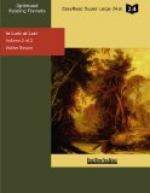Then there was another pupil, a girl who was working her very hardest in order to become, as she hoped, a first-class governess, and who, poor thing! by reason of her natural thickness would never reach even the third rank. Iris would have been sorry for her, because she worked so fiercely, and was so stupid, but there was something hard and unsympathetic in her nature which forbade pity. She was miserably poor, too, and had an unsuccessful father, no doubt as stupid as herself, and made pitiful excuses for not forwarding the slender fees with regularity.
Everybody who is poor should be, on that ground alone, worthy of pity and sympathy. But the hardness and stupidity, and the ill-temper, all combined and clearly shown in her letters, repelled her tutor. Iris, who drew imaginary portraits of her pupils, pictured the girl as plain to look upon, with a dull eye, a leathery, pallid cheek, a forehead without sunshine upon it, and lips which seldom parted with a smile.
Then there was, besides, a Cambridge undergraduate. He was neither clever, nor industrious, nor very ambitious; he thought that a moderate place was quite good enough for him to aim at, and he found that his unknown and obscure tutor by correspondence was cheap and obliging, and willing to take trouble, and quite as efficacious for his purposes as the most expensive Cambridge coach. Iris presently discovered that he was lazy and luxurious, a deceiver of himself, a dweller in Fool’s Paradise and a constant shirker of work. Therefore, she disliked him. Had she actually known him and talked with him, she might have liked him better in spite of these faults and shortcomings, for he was really a pleasant, easygoing youth, who wallowed in intellectual sloth, but loved physical activity; who will presently drop easily, and comfortably, and without an effort or a doubt, into the bosom of the Church, and will develop later on into an admirable country parson, unless they disestablish the Establishment: in which case, I do not know what he will do.
But this other man, this man who was coming for an explanation, this Mr. Arnold Arbuthnot, was, if you please, a very different kind of pupil. In the first place he was a gentleman, a fact which he displayed, not ostentatiously, in every line of his letters; next, he had come to her for instruction—the only pupil she had in that science, in heraldry, which she loved. It is far more pleasant to be describing a shield and settling questions in the queer old language of this queer old science, than in solving and propounding problems in trigonometry and conic sections. And then—how if your pupil begins to talk round the subject and to wander into other things? You cannot very well talk round a branch of mathematics, but heraldry is a subject surrounded by fields, meadows, and lawns, so to speak, all covered with beautiful flowers. Into these the pupil wandered, and Iris not unwillingly followed. Thus the teaching of




